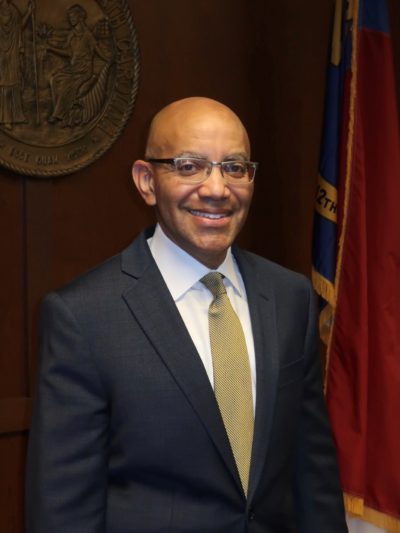The State Board of Community Colleges held its first meeting of the year on Thursday and Friday, where they revisited their legislative agenda, discussed the shift to online learning, and heard from new system president Thomas Stith.
“Thank you for your confidence in me to lead the North Carolina Community College System at this time in history,” Stith said. “We’re at a crucial point, and I want to appreciate that honor.”
Stith thanked former interim president Dr. Bill Carver and praised the leadership team at the system office. “I’ll be moving forward in the near term to bring new members on board to add to the very strong team that we already have,” he said, referring to open positions at the system office.
He discussed his intention to be present in the General Assembly to advocate for the state’s community colleges.
“Not only were we there before the session began, we’re going to be there throughout,” Stith said. “We have faculty and staff salaries, stabilization of budget. We have very aggressive innovation in IT, and it is going to be very important for the system office to be present, to be engaged, and to ensure that our legislative goal as we work with the presidents and trustees is accomplished in this session.”
Stith also discussed expanding the system’s partnerships, including using unallocated ConnectNC bond funding to partner with contractors and business owners of color to advance economic opportunity.
“There’s about $20 to $25 million of ConnectNC bond funding that has not been allocated,” Stith said, “and there may be an opportunity for the community college system to partner with minority businesses and contractors in work that’s planned for our local community colleges, which is a way for bringing economic opportunity into those communities that will see that type of bond funding, in either renovations or new buildings.”
Mary Shuping, director of government relations for the Community College System, revisited the system’s legislative priorities as the legislature kicked off their session Jan. 13.
“I think the first thing that the legislature is really looking at is trying to go through and sort through the COVID needs that are still outstanding,” Shuping said.
One of those needs, she said, is the system’s funding request to help stabilize colleges’ budgets due to enrollment declines from COVID. Because the majority of state funding for community colleges depends on enrollment, fewer students means less funding. The system is asking for non-recurring funding to keep community college budgets at at least 98.5% of 2020-21 funding levels. System leaders refer to this legislative ask as “budget stabilization.”
In addition to budget stabilization funding, the system is looking to secure $62 million in recurring funds to increase employee salaries. As Elizabeth Grovenstein, chief financial officer for the North Carolina Community College System, told the Board in December, North Carolina’s community college faculty rank 40th in the nation for pay. The $62 million is meant to fund a 5% increase in salary.
The system is also seeking $3.5 million in recurring and $28.5 non-recurring funds to upgrade its IT infrastructure.
Jesse Watts, president of the North Carolina Comprehensive Community College Student Government Association (CSGA), spoke on student experiences with online learning amidst the COVID-19 pandemic.
“This last semester’s presented a challenge for us, and it’s tested our resilience,” Watts said. “We were forced to distance ourselves from our family and friends, peers and coworkers. We’ve had to connect to artificial eyes, listen to voices through speakers of computers, and view the world from the inside looking out.”
Throughout the past semester, Watts continued, students have dealt with these challenges along with financial hardships, unemployment, and fear of the unknown. Watts emphasized the toll these last months have had on students’ mental health.
“As we continue to adapt to this new way of life, we also understand that we need to keep our mental health intact,” Watts said.
Burr Sullivan, chair of the strategic planning committee, discussed the possibility of adding a “director of online learning” to oversee the system’s online shift.
“That director would ensure that our system is positioned as a leader in high quality content delivery,” Sullivan said. “That’s an overall goal.”
The next Board meeting is on Feb. 18.




